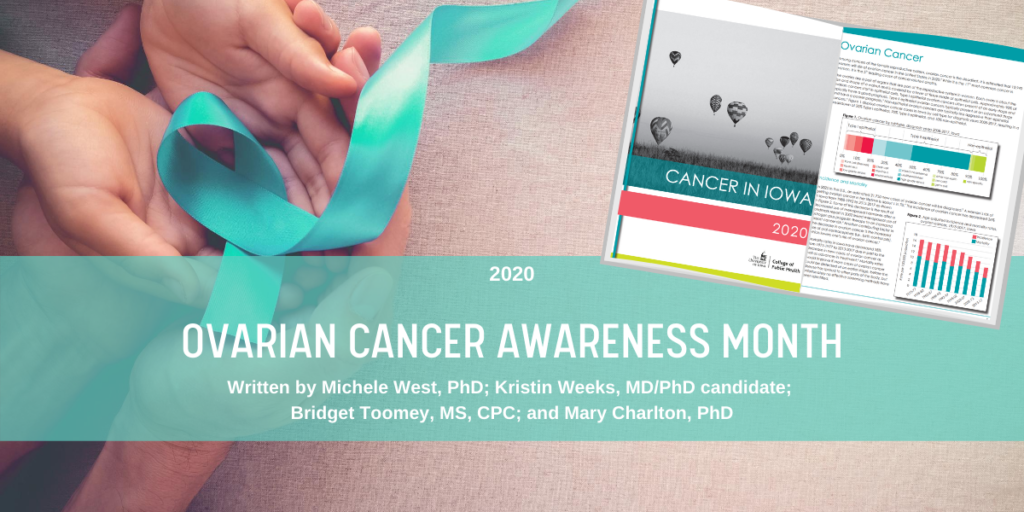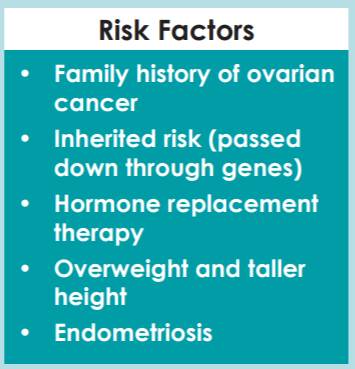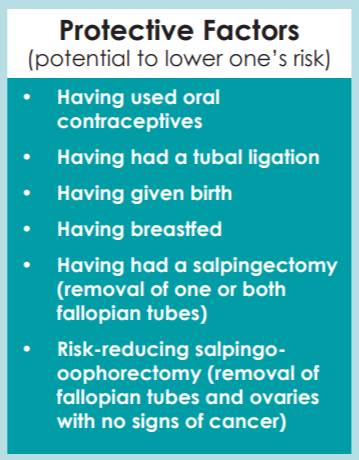Ovarian Cancer Awareness Month

By: Michele West, PhD; Kristin Weeks, MD/PhD candidate; Bridget Toomey, MS, CPC; and Mary Charlton, PhD
It’s September, which also means it is Ovarian Cancer Awareness Month! Help us spread the word about ovarian cancer by wearing teal, the ovarian cancer awareness color, throughout the month of September and by sharing the signs and symptoms of the disease. Ovarian cancer is also the focus of the 2020 Cancer in Iowa Report by the Iowa Cancer Registry.
Among cancers of the female reproductive system, ovarian cancer is the deadliest. It is estimated that 13,940 women will die of ovarian cancer in the United States in 2020, including 150 women in the state of Iowa. Survival rates in Iowa have increased from 34.9% in 1973-1977 to 50.7% in 2013-2017 due in part to a decrease in new cases of ovarian cancer being diagnosed as well as advances in treatment.
Survival rates would improve further if more cases of ovarian cancer could be detected at an earlier stage and more women received guideline recommended treatment. Currently, about one-fourth of all cases of ovarian cancer are detected while the cancer is confined to the ovaries. However, over half are diagnosed with spread to the abdomen or to distant areas in the body.
Symptoms
There are currently no effective population-based routine early detection or screening tools for the disease. Additionally, the early signs and symptoms are often vague and go unnoticed or misdiagnosed as something else. The most common symptoms of ovarian cancer include:
- Feeling bloated
- Indigestion
- Pain in the pelvis or abdomen
- Trouble eating or feeling full fast (satiety)
- Feeling the need to urinate often or urgently
If you, or someone you love, has these symptoms, then tell your doctor.
Remember B.E.A.T. to help recognize the subtle symptoms of ovarian cancer. Recognizing these symptoms and discussing them with your doctor may help find ovarian cancer earlier, leading to a better prognosis for this disease. Order your own free B.E.A.T. cards in English or Spanish to share in your community this month.
Risk and Protective Factors
There are some known risk factors for ovarian cancer as well as some protective factors known to lower the risk of ovarian cancer. However, their associated risk and protective effect are relatively small and have not translated to practical ways to prevent ovarian cancer. If you are concerned about your risk for developing ovarian cancer, then it is important to talk to your doctor or healthcare professional.


Surgery is the primary treatment for most ovarian cancers. Experts recommend that a gynecologic oncologist, a surgeon with highly specialized training in treating cancers that start in a woman’s reproductive organs, should perform ovarian cancer surgery. Most women go on to receive chemotherapy after surgery. Some receive chemotherapy before surgery and during surgery. Targeted therapy, another type of treatment, uses drugs or other substances to identify and attack specific cancer cells without harming normal cells.
Research
Much of the ovarian cancer research in the US and abroad focuses on creating new targeted therapies and understanding the role of BRCA and other gene mutations in the development and outcomes of ovarian cancer. Consequently, this research could lead to significant breakthroughs in the prevention of ovarian cancer and the development of more effective treatments that could improve quality of life and survival for patients diagnosed with ovarian cancer.
The Iowa Department of Public Health, the Iowa Cancer Registry and the Iowa Cancer Consortium joined forces to participate in a study funded by the Centers for Disease Control and Prevention (CDC) to better understand treatment patterns and survival for patients with ovarian cancer living in the Midwestern US. Additionally, our team completed a study called Viewpoints in Ovarian Cancer Treatment and Referral. The purpose of this study was to understand the perspectives and referral practices of hospital administrators, medical oncologists, and obstetrics and gynecology physicians in Iowa when referring and treating ovarian cancer patients, as well as the experiences of patients with ovarian cancer.
The results of this study suggest patients were willing to receive treatment wherever their doctors recommended; however not all women received referrals to gynecologic oncologists for surgical care. Therefore, we are working to develop educational materials to inform providers and patients about the importance of referrals to gynecologic oncologists for ovarian cancer surgical care. Our goal is to improve access to standard of care treatment for all Iowans diagnosed with ovarian cancer.
If you have ideas on how we can share our work with referring providers or patients, then please reach out! This project is, after all, a community effort and we want your input to better serve Iowans.
Contact the Authors
Michele West, PhD
Associate Research Scientist, University of Iowa
Coordinator for Special Projects, Iowa Cancer Registry
[email protected]
Kristin Weeks, MD/PhD candidate at University of Iowa
Department of Epidemiology, University of Iowa
[email protected]
Bridget Toomey, MS, CPC
Assistant Clinical Director, Department of Obstetrics and Gynecology at University of Iowa Health Care
Advocate Leader, Ovarian Cancer Research Alliance
[email protected]
Associate Professor, Department of Epidemiology
Director and Principal Investigator, Iowa Cancer Registry
[email protected]

